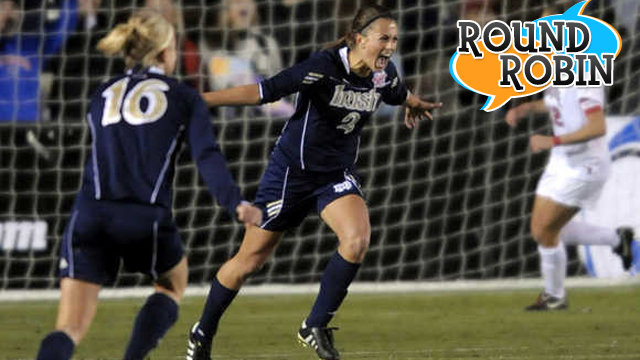 Morgan Andrews recently changed her
Morgan Andrews recently changed her verbal commitment from Boston College
to Notre Dame

Welcome to the Tuesday, July 10 edition of the TopDrawerSoccer.com Round Robin, where our editorial staff members weigh in on important topics in the world of American soccer. Please note that each opinion expressed is that of the author giving them, and not necessarily editorial policy at TopDrawerSoccer.com.
Today’s Topic: Switching Commitments. College recruiting involves schools securing verbal commitments from players, but nothing is official until the signing of a National Letter of Intent in February of the player’s senior year in high school. With players on the girls’ side now making (and being asked to make) verbal commitments as many as two full years prior to that date, the number of changed verbal commitments is increasing noticeably.
Is it wrong or right for a player to retract her verbal commitment and switch to another school?
 Morgan Andrews recently changed her
Morgan Andrews recently changed her Robert Ziegler: It really is a case-by-case basis. These players are being recruited very early and as we discussed yesterday, it’s not difficult for coaches to get in touch and basically make offers well in advance of the actual signing day. Some players may feel an opportunity is about to be lost if they don’t commit quickly enough (actually almost every recruit will say this). On the other hand, some of the earliest commitments often end up switching and at can times it can be difficult to see what the rush was. It’s an important decision for a young lady (going way beyond soccer) and a typical student is welcome to change their mind on a school (and isn’t pressured to commit early in the first place), but with so many players switching, some more than once in the process, it does start to beg the question “How do you define ‘commitment.’”
Caroline Yort: We covered this topic somewhat in our Recruiting Guide. I think it really does depend on the situation, as Rob said. Players can have a completely different idea of what school and program are right for them as a sophomore than by the time they are a senior. And sometimes a player commits to a school, then the coach leaves, or the school changes conferences, both of which would make a player second-guess his or her commitment. I have spoken to parents of players recently who have questioned their children's commitments for those reasons - some de-committed, some did not. I do think, however, that the players and their families have to consider if the reason for changing the commitment is valid, or if it is merely teenage whim.
Travis Clark: I don't think that it's an ethical issue. Players having to make a verbal commitment very early on may or may not have a strong idea of what he/she wants out of a college program. I can empathize with the uncertainty. Now I don't mean that as a license to change a commitment on a whim, or to flip-flop, as that could end up being costly, but rather there should be some leeway on offer for those that want to change his or her mind.
J.R. Eskilson: There is nothing binding about the verbal commitment, so I see no reason to think it is unethical for a player to switch prior to signing and to steal a quote from George R. R. Martin, 'words are wind.' Idealistically, I'd like to think most switches have more to do with academia, but I will not kid myself with that line of reasoning. I think switching [for any reason] on a verbal commitment is still a foreign concept now, but the future promises more acceptance to the practice - more recruits are looking into it and with high speed conference realignment and coaching staff overhauls, it is difficult to blame anyone if they don't want to stick with a school as everything changes since they gave their word. As a former teenager, I feel like I can speak about how quickly infatuation passes and how difficult it is not to be caught in the moment. To give a specific example, there is a recent Pac-12 men's soccer recruit who gave his word to the school without even hearing the financial terms of the scholarship. The player was so caught up in the glitz and glam of the school that he failed to take into account the nitty, gritty. After a year of blissfully ignoring the pressing issue, the player's parents eventually had to sit down with the coaching staff and iron out some details before the program gave away the rest of its scholarships for that season. To an extent, it worked out for the player [he is sticking with the school and received some financial help], but I'd hate to see a situation where he was forced to stay with that school if it had no aid for him.
Robert Ziegler’s Final Word: While nobody is suggesting that a verbal commitment should somehow be contractually binding, and while I agree that programs who get burned by this are largely dealing with the consequences of their own efforts to secure very early commitments in the first place, I have a hard time not thinking that there is at least a potential issue with reneging on the “commitment", depending on the circumstances.
Keep in mind this is a nearly a one-way street. How would you all feel if the programs started pulling their (already accepted) offers to players in the same way? Would “The pressure of the competition just swayed us too much” or “We just found someone we liked better” be considered acceptable arguments from parents and players, or would the schools and coaches who started doing that begin to be viewed in a different light. I understand it is not a simple question, but I think that is a true statement going both ways.
Join us tomorrow for another version of Round Robin.